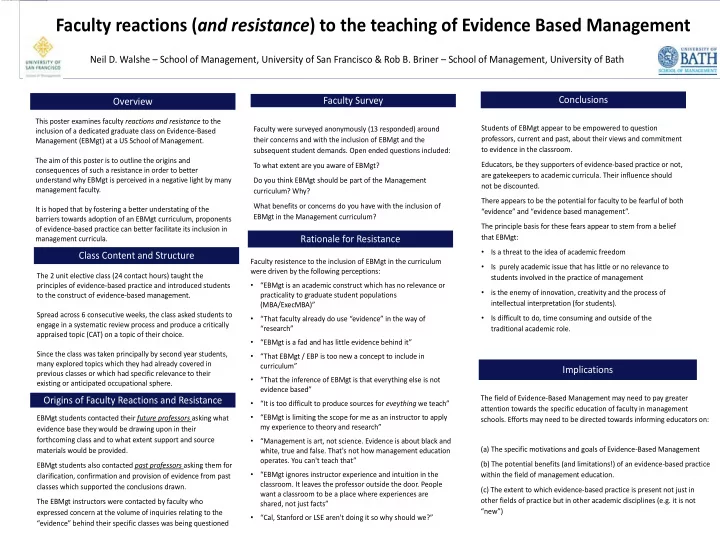

• Faculty reactions (and resistance) to teaching EBMgt Faculty reactions ( and resistance ) to the teaching of Evidence Based Management Neil D. Walshe – School of Management, University of San Francisco & Rob B. Briner – School of Management, University of Bath Conclusions Faculty Survey Overview This poster examines faculty reactions and resistance to the Students of EBMgt appear to be empowered to question Faculty were surveyed anonymously (13 responded) around inclusion of a dedicated graduate class on Evidence-Based professors, current and past, about their views and commitment their concerns and with the inclusion of EBMgt and the Management (EBMgt) at a US School of Management. to evidence in the classroom. subsequent student demands. Open ended questions included: The aim of this poster is to outline the origins and Educators, be they supporters of evidence-based practice or not, To what extent are you aware of EBMgt? consequences of such a resistance in order to better are gatekeepers to academic curricula. Their influence should understand why EBMgt is perceived in a negative light by many Do you think EBMgt should be part of the Management not be discounted. management faculty. curriculum? Why? There appears to be the potential for faculty to be fearful of both What benefits or concerns do you have with the inclusion of It is hoped that by fostering a better understating of the “evidence” ¡and ¡“evidence ¡based ¡management”. ¡ EBMgt in the Management curriculum? barriers towards adoption of an EBMgt curriculum, proponents The principle basis for these fears appear to stem from a belief of evidence-based practice can better facilitate its inclusion in that EBMgt: Rationale for Resistance management curricula. • Is a threat to the idea of academic freedom Class Content and Structure Faculty resistence to the inclusion of EBMgt in the curriculum • Is purely academic issue that has little or no relevance to were driven by the following perceptions: The 2 unit elective class (24 contact hours) taught the students involved in the practice of management • principles of evidence-based practice and introduced students “EBMgt ¡is ¡an ¡academic ¡construct ¡which ¡has ¡no ¡relevance ¡or ¡ • is the enemy of innovation, creativity and the process of to the construct of evidence-based management. practicality to graduate student populations intellectual interpretation (for students). (MBA/ExecMBA)” Spread across 6 consecutive weeks, the class asked students to • • Is difficult to do, time consuming and outside of the “That ¡ faculty already ¡do ¡use ¡“evidence” ¡in ¡the ¡way ¡of ¡ engage in a systematic review process and produce a critically “research” traditional academic role. appraised topic (CAT) on a topic of their choice. • “EBMgt ¡is ¡a ¡fad ¡and ¡has ¡little ¡evidence ¡behind ¡it” Since the class was taken principally by second year students, • “That ¡EBMgt ¡/ ¡EBP ¡is ¡too ¡new ¡a ¡concept ¡to ¡include ¡in ¡ many explored topics which they had already covered in curriculum” Implications previous classes or which had specific relevance to their • “That ¡the ¡inference ¡of ¡EBMgt ¡is ¡that ¡everything ¡else ¡is ¡not ¡ existing or anticipated occupational sphere. evidence ¡based” The field of Evidence-Based Management may need to pay greater Origins of Faculty Reactions and Resistance • “It ¡is ¡too ¡difficult ¡to ¡produce ¡sources ¡for ¡ eveything we ¡teach” attention towards the specific education of faculty in management • “EBMgt ¡is ¡limiting ¡the ¡scope ¡for ¡me ¡as ¡an ¡instructor ¡to ¡apply ¡ EBMgt students contacted their future professors asking what schools. Efforts may need to be directed towards informing educators on: my ¡experience ¡to ¡theory ¡and ¡research” evidence base they would be drawing upon in their forthcoming class and to what extent support and source • “Management ¡ is art, not science. Evidence is about black and (a) The specific motivations and goals of Evidence-Based Management materials would be provided. white, true and false. That's not how management education operates. You can't teach that” (b) The potential benefits (and limitations!) of an evidence-based practice EBMgt students also contacted past professors asking them for • “ EBMgt ignores instructor experience and intuition in the within the field of management education. clarification, confirmation and provision of evidence from past classroom. It leaves the professor outside the door. People classes which supported the conclusions drawn. (c) The extent to which evidence-based practice is present not just in want a classroom to be a place where experiences are other fields of practice but in other academic disciplines (e.g. it is not The EBMgt instructors were contacted by faculty who shared, not just facts” “new”) expressed concern at the volume of inquiries relating to the • “Cal, ¡Stanford ¡or ¡LSE ¡ aren't doing it so why should we?” “evidence” ¡behind ¡their ¡specific ¡classes ¡was ¡being ¡questioned
Recommend
More recommend